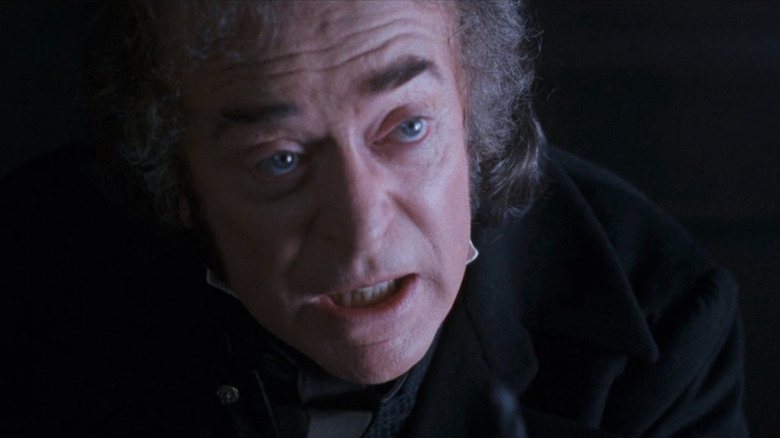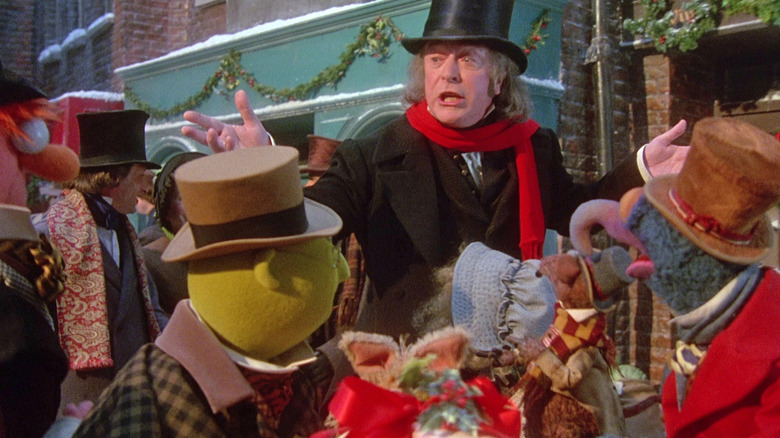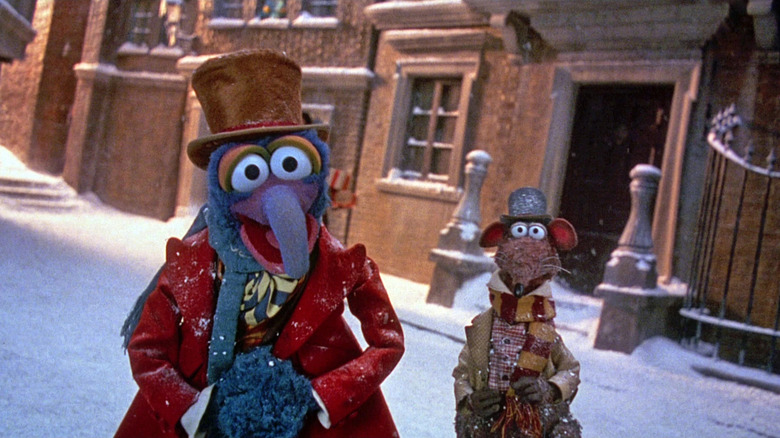Michael Caine Never Knew He Could Sing Until The Muppet Christmas Carol
"A Christmas Carol" by Charles Dickens was embraced by the British public from the moment it first dropped in 1843; it was an instant bestseller and the work has never been out of print since (via ThoughtCo). Almost 60 years later, the festive tale took a leap to the new-fangled medium of cinema with "Scrooge, or Marley's Ghost" in 1901. That title hinted at a vision of Film Adaptations Yet to Come; Scrooge was the star of the show and would become a juicy role for dozens of famous actors over the next 120 years.
Since Daniel Smith donned Scrooge's nightcap in that pioneering first adaptation, George C. Scott, Albert Finney, Reginald Owen, Patrick Stewart, and Henry Winkler have all given their distinctive take on the role, while Alastair Sim remains many people's definitive version of the character. Bill Murray put a modern spin on the tale in "Scrooged," while in animation we've had Mr. Magoo, Scrooge McDuck, and a CGI Jim Carrey version. And that's just to name a few.
Michael Caine brought his special brand of stone-cold glares to the part in 1992 alongside some very unlikely co-stars in "The Muppet Christmas Carol," a poignant entry to the franchise after Jim Henson passed away two years earlier. The puppeteer's son Brian took the reins while Caine committed to playing Scrooge completely straight. He said (via The Guardian):
"I'm going to play this movie like I'm working with the Royal Shakespeare Company. I will never wink, I will never do anything Muppety. I am going to play Scrooge as if it is an utterly dramatic role and there are no puppets around me."
Caine kept to his word, but he also needed to add another talent to his already formidable repertoire for the role: singing.
Michael Caine sings!
Michael Caine wasn't first in line to play Ebenezer Scrooge in "The Muppet Christmas Carol." David Hemmings, George Carlin, David Warner, and Ron Moody (who played another Dickens character, Fagin, so memorably in "Oliver!") we all considered before Brian Henson offered the role to the "Get Carter" star. From Caine's perspective, he saw a chance to make a movie suitable for his seven-year-old daughter. It also helped him extend his range as the part required him to sing. When asked about it in 2016, he said (via GQ):
"Well I didn't know I could sing as well as it turned out! I mean it wasn't bad, I wasn't ashamed of it. I thought I was going to make a fool of myself but it didn't matter, because it's Muppets, you know. Scrooge sings badly, and it's fine! It's funny! But I thought we sang quite well as a duet, Kermit and me."
His singing voice isn't the strongest, but it is pretty charming how he basically speaks most of his lyrics in a lighter register while attempting a little jig in "Thankful Heart." It seems in keeping with Scrooge's character; I don't know why, but it would have been weird if he suddenly broke out in a luxuriant tenor's voice.
Caine had sung on film previously, performing a valiant duet with Sean Connery at the end of "The Man Who Would Be King" before the latter character's heroic demise. He would also take to the microphone a few years later as sleazy talent manager Ray Say in "Little Voice," belting out a bitter rendition of "It's Over" to a stunned audience. Sir Michael might not sing all that much in movies, but when he does burst into tune, he sure makes it count.
Brian Henson wanted to do justice to Charles Dickens
When it came to how Brian Henson would follow his dad's legacy for his directorial debut, he decided to make a departure from the previous three Muppet movies (via The Guardian). After the Emmy Award-winning success of "The Muppet Show," Kermit and the gang made their big-screen debut in 1979 with "The Muppet Movie," a box office hit that led to two sequels. The three films are lively musical capers set in the modern world with a raft of celebrity human cameos, like Orson Welles, Steve Martin, Peter Ustinov, and Joan Rivers, among many others. By choosing to make a version of "A Christmas Carol," the younger Henson changed the formula by not only adapting a great Victorian literary work but also putting a human character in the most important role: Ebenezer Scrooge.
Henson also wanted to do justice to the source material, which he did by "casting" The Great Gonzo as Dickens himself and giving the zany character a whole bunch of the original prose to read, while Rizzo the Rat got most of the gags as his co-narrator. The rest of the casting was just as inspired: Kermit the Frog played Bob Cratchit, Scrooge's good-natured employee, while the famous amphibian's nephew Robin melted hearts as Tiny Tim. Grumpy old Statler and Waldorf were the perfect fit for Jacob and Robert Marley, a dual version of the first apparition to visit Scrooge and let him know three more ghosts were on the way. As for the Ghosts of Past, Present, and Yet to Come, several existing Muppet characters were considered before Henson opted for new creations that would better serve the spirits' spooky function in the story. The best of the bunch, though, was Michael Caine as the famous miser, dodgy singing voice and all.


